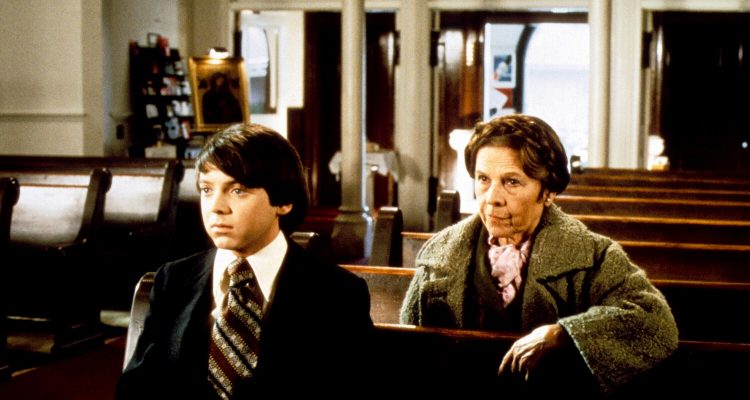 “Harold and Maude” (1971)
“Harold and Maude” (1971)
Ashby’s dark spin on “The Graduate” stars Bud Cort as Harold, a wealthy, suicidal teenager who forms a friendship with 80 year old Maude (Ruth Gordon) and swaps Simon & Garfunkel for Cat Stevens. If you’ve never seen it before, you might think your only cultural reference point for this odd couple comedy as being “the greatest love story of our time,” as Cameron Diaz’s character refers to it in “There’s Something About Mary.” But watching the film will reveal it’s influence over modern moviemaking as being much broader (Wes Anderson in particular did some heavy plundering here, borrowing the films center-of-frame compositions, deadpan humor and even taking Cort along for “The Life Aquatic.”). Easily Ashby’s funniest film, but also containing pure heartbreak (it’s hard to imagine the central relationship being treated with as much empathy — there’s that word again — by any other helmer), you can’t imagine a director more perfectly suited to the project: a middle-aged man who’d fully embraced the swinging Sixties, a humanist whose films never shied from the darker side of life, the film’s central characters feel like Ashby’s been split into two different figures. He didn’t write it, but it’s the film we’ll always associate most closely with the director. The soundtrack, by Cat Stevens, is a hall-of-famer, but remarkably wasn’t available until a super-limited 2007 vinyl, featuring liner notes from Cameron Crowe, was released. We would urge you to get it, but copies are now going for as much as $600… [A]
 “The Last Detail” (1973)
“The Last Detail” (1973)
God damn if Jack Nicholson didn’t have one of the greatest runs an actor could have in the early 1970s. Between 1970 and 1975, the actor, who only really attained stardom in 1969’s “Easy Rider,” starred in “Five Easy Pieces,” “Carnal Knowledge,” “The King Of Marvin Gardens,” “Chinatown” and “One Flew Over The Cuckoo’s Nest,” and slap in the middle of all of these was Hal Ashby’s wondrous “The Last Detail.” Nicholson stars, in a role that fits like a glove, as one of two sailors (the other being the marvelous Otis Young, who mostly gave up acting afterwards to become a pastor and college professor), who are ordered to escort a young colleague, Meadows (Randy Quaid, well before he went off his nut) to Naval Prison in New Hampshire, for a chronically unfair 8-year-sentence for a minor crime. Like a real-world version of “On The Town,” Nicholson and Young decide to give Meadows a proper send off, full of sex and drinking, and it’s this realism that makes the film sing: the script, by Robert Towne, is never rose-tinted: it’s clear that Nicholson’s quest is making things worse, rather than better, and however much the men might bond, it doesn’t last, as the fiercely unsentimental ending makes clear. It’s a film for which the term ‘bittersweet,’ a term that Ashby firmly made his own, was invented. [A]
 “Shampoo” (1975)
“Shampoo” (1975)
Considering the pathetic excuses for what pass as relationship comedies these days, it’s possible that “Shampoo” looks even better in hindsight. But that would do the brilliance of the film a disservice. A passion project of star Warren Beatty, who co-wrote the script with Robert Towne, the film was designed as a contemporary reworking of restoration comedies like “The Country Wife,” with Ashby turning his eye on the sexual revolution of the late 1960s, and commenting on the just-finished Nixon era. The archetype of the cad-rethinking-his-life is a famililar one now, but Beatty essentially invented it for the modern era here, playing a womanizing hairdresser, bedding both the wife, daughter and mistress of the man he wants to back his own salon. The film might owe a debt of gratitude to “Alfie,” but it’s infinitely more successful — bitingly funny, just the right side of farce, but simultaneously consistently insightful about men and women fucking each other. The supporting cast is terrific, particularly Jack Warden, as the man Beatty cuckolds, the Oscar-winning Lee Grant and Julie Christie, here second only to Grace Kelly in “Rear Window” in the Jesus-Christ-was-there-ever-a-woman-as-beautiful-as-this-before-or-since stakes. But it’s Beatty at the center of it, and he was never better. The great László Kovács shoots it gloriously, and Paul Simon’s score is wonderful too, overshadowed by his contribution to “The Graduate,” but just as vital here. [A]

